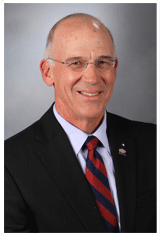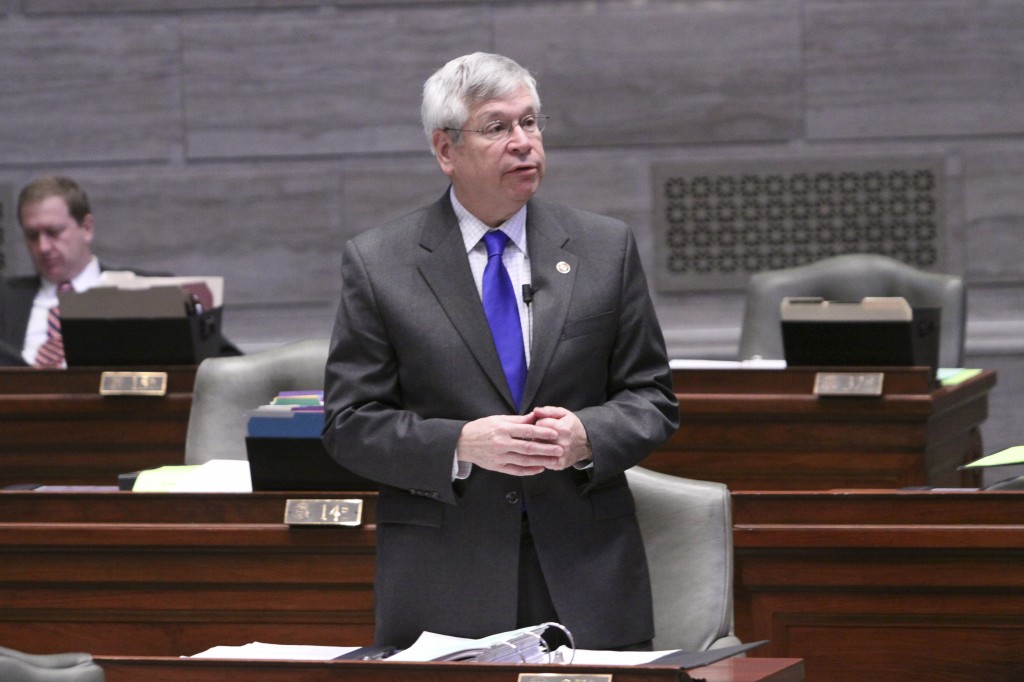JEFFERSON CITY, Mo. – The Missouri Senate’s latest endeavor might be the most contentious item they will debate on this session. The chamber on Tuesday morning took up for the first time Sen. Ed Emery’s SB 190, a bill focused on adjusting ratemaking rules and implementing grid modernization in the Show-Me State.
Sen. Gary Romine led a successful filibuster of the legislation. After roughly four-and-a-half hours of total debate on the bill Tuesday, Emery laid the bill over on the informal calendar.
The bill has already been the subject of much debate in hearings earlier this session with dozens of lobbyists and utility companies pushing for the passage of the legislation.

SB 190 is a continuation of a bill that first came forward last year, but Emery says that the main issue that they failed to accomplish any real work on the legislation was because of the timing. He said that by the time it was brought up on the Senate floor, it was late and session. The size of the legislation was also a major factor, carrying an excess of more than 100 pages.
However, Sen. Gary Romine has served as a major road block to the legislation’s passage. Last year, he led a filibuster late in the 2016 Legislative Session to defeat that version of the bill, and he appears ready to stop it again as he and a handful of other senators in opposition spoke at length to stall the bill’s progress. He pointed out that while high-tech meter readers could help customers save money, they could also displace people from jobs.
Romine believes SB 190 is meant to line the utility companies’ pockets with more income, while costing Missouri consumers more of their hard-earned money.
Wallingford switches to support utilities bill
Yet Romine will have one less senator to work with on the filibuster as Sen. Wayne Wallingford spoke on the floor with Emery about the bill favorably, despite being part of the self-named “Magnificent Seven” opposed to the bill in past sessions.

“For about four years, I’ve been on the other side of the fence on this,” Wallingford told The Missouri Times, adding that he has opposed the bill since he sat on the energy committee four years ago. “I was concerned about runaway rates for consumers, I was concerned about circumventing the PSC [Public Service Commission].”
Now, he supports the bill.
“We used to call ourselves the ‘Magnificent Seven,’ ” Wallingford said of the opposition to the bill. “Since I’m not there anymore it might be ‘Magnificent Six.'”
Wallingford said that in talks with Ameren, Missouri’s largest utilities provider, they eventually found common ground despite four years of opposition. He said Ameren worked with Wallingford to address his concerns, and he offered a further Senate substitute during debate to add penalties to companies who increase their rates too much.
Wallingford also supports the bill because it institutes a smart grid and makes strong steps towards increasing cybersecurity to protect against outside threats.
Economic impact
The Cape Girardeau senator also believes the bill will help Missouri consumers, including businesses. A major focus in this legislative session has been economic development and job creation. Proponents of the bill point to increased options for consumers and customer savings in the long term, as well as the revitalization of Missouri’s aging electrical grid. Ameren’s proposed $1 billion infrastructure improvement plan, which would span over a five-year period, expected to cost consumers about $1 more each month. Ameren expects that it could create up to 3,000 more jobs.
“Part of the reason I liked this bill is that I felt it creates jobs for Missourians. Is this going to create jobs? If it is, will they be good-paying jobs?” Sen. Gina Walsh asked. “That’s what’s important to me.”
Emery referenced Ameren’s proposal, pointing to the investments which would require workers to build or modify the grid. But while Emery referenced the potential for increased employment opportunities in a highly paid industry, but Walsh expressed some concern over the use of contractors as opposed actual jobs. Emery said that language had been changed to assuage her concerns.
The legislation seeks to also adjust ratemaking mechanisms to allow companies to better recover their costs. The Missouri Public Service Commission currently does not allow utility companies to recover their costs until they can have a rate case. During that process, the commission looks at the expenditures made, the revenues accumulated, the cost of capital and borrowing, and the costs of maintaining and servicing that grid.
Just this year, the PSC came to an agreement over Ameren Missouri’s rate case, which resulted in the recovery of roughly $90 million for Ameren. They had requested more than $200 million.
Emery and the supporters of the bill argue that those same ratemaking mechanisms are out-of-date. They have been in place since 1913.
“The whole idea of the restructure, and one of the things that is good about is that essentially for every dollar that is invested on these infrastructure upgrades, the customers will see the benefit of somewhere around $2.50 to $3.50,” Emery said.
Emery did attempt to place an amendment onto his legislation, limiting what rate increases can happen. His amendment would keep rates from growing over 3 percent.
Wallingford’s proposed amendment would penalize companies who exceed that 3 percent cap. Wallingford’s amendment would, in essence, be a pass/fail performance amendment, meaning that if a company were to go over 3.75 percent in a year, they would no longer be able to use the program, opting out for failing, and would be forced to start the process all over again.
Still, that was not enough to convince the “Magnificent Six.” However, two of that six are now statewide office holders in Lt. Governor Parson and State Treasurer Eric Schmitt, which could give Romine even fewer resources. Romine questioned why the bill is needed in an inquiry with Sen. Doug Libla, saying that companies can already invest now, that nothing is stopping them from doing so.
“In reality, why do we need this bill?” he asked. “It’s already been proven that it can be done.”
“This is not just about businesses. Folks just want to get their electricity. I know that you [Romine] are looking out for the common folks. They don’t have much of a voice here,” Libla responded. “When you’ve got over 40 lobbyists working on a bill, that should give a little bit of a clue that there could be something just a little sidewinding on that bill.”
Libla’s comment about the number of lobbyists is one that has been often been brought up during discussions on this bill, as multiple companies have employed lobbyists for this particular legislation.
The discussion eventually gave way to a full filibuster as Romine began inquiring of Sen. Rob Schaaf, who eventually took the floor himself. He began reading Sun Tzu’s Art of War and called for a quorum three times in a 10-minute span. After roughly four-and-a-half hours of total debate on the bill Tuesday, Emery laid the bill over on the informal calendar.
Travis Zimpfer contributed to this report.
Benjamin Peters was a reporter for The Missouri Times and Missouri Times Magazine and also produced the #MoLeg Podcast. He joined The Missouri Times in 2016 after working as a sports editor and TV news producer in mid-Missouri. Benjamin is a graduate of Missouri State University in Springfield.












